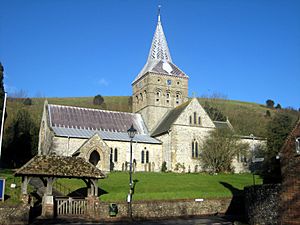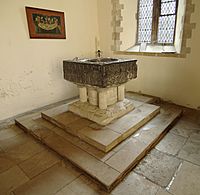All Saints Church, East Meon facts for kids
Quick facts for kids All Saints' Church, East Meon |
|
|---|---|

All Saints' Church, East Meon
|
|
| Lua error in Module:Location_map at line 420: attempt to index field 'wikibase' (a nil value). | |
| Location | East Meon, Hampshire |
| Country | England |
| Denomination | Anglican |
| Website | http://www3.hants.gov.uk/parish/east-meon |
| History | |
| Status | Parish church |
| Founded | c. 1080 or c. 1130–40 |
| Dedication | All Saints |
| Architecture | |
| Functional status | Active |
| Heritage designation | Listed building – Grade I |
| Style | Norman, Early English |
| Specifications | |
| Materials | Stone |
| Administration | |
| Diocese | Portsmouth |
| Province | Canterbury |
All Saints' Church is a very old church in the village of East Meon, Hampshire, England. It's part of the Church of England. This church is the oldest building in the village. It's so close to a hill (part of the South Downs) that they couldn't build a north side! Most of the church was built during the Norman times. Later, in the 13th century, a south chapel and south aisle were added.
Many people think this church is special. One expert called it "one of the most thrilling village churches in Hampshire." Another said it was "a striking, boldly massed church set above the village."
Contents
History of All Saints' Church
Building the Norman Church
It's not completely clear when the church building started. Some say it was between 1130 and 1140. Others believe it was around 1080. It was likely built by Bishop Walkelin, who also rebuilt Winchester Cathedral. The church probably stands on a spot where an older Anglo-Saxon building once stood. The church we see today was mainly built by the Normans.
The first church was shaped like a cross. It was about 110 feet long and 62 feet wide. You can still see its original Romanesque arches. The church tower was built around 1150. The tall, pointed spire on top was added later, probably around 1230. Its decorations look similar to those at Winchester Cathedral. You can even see the spire from the South Downs Way walking path!
The Ancient Tournai Font
Inside the church, there's a huge and fancy font from about 1130–40. A font is a basin used for baptisms. This one is made of a dark stone called Tournai marble, which isn't true marble but a type of limestone. It likely came from Tournai, a place in Belgium.
This font was probably a gift from Henry of Blois, who was a Bishop of Winchester. Its sides have amazing carvings made by artists from Flanders. These carvings show stories like the creation of Adam and Eve and their temptation. They also show animals, birds, and dragons.
Changes from the 13th to 18th Century
The south chapel (also called the Lady Chapel) and the south aisle were added in the early 13th century. These parts are in the Early English style, which is a type of Gothic architecture. The windows in the south aisle were put in later.
The east window of the Lady Chapel was designed by Sir Ninian Comper in the 20th century. He also designed the chapel's wooden and alabaster reredos (a screen behind the altar). The church's chancel (the area around the altar) was rebuilt between 1470 and 1498. You can see clues to this in the coats of arms on the chancel's east wall. The windows in the south chapel also date from the late 15th century.
For many years, during the 18th and early 19th centuries, the north transept (a part of the church) was used as a Sunday school. It also served as a school for 160 children. The school moved to its own building in 1845.
Restorations in the 19th and 20th Century
In 1869–70, Ewan Christian led a big restoration of the church's inside. Old high pews and galleries from the 18th century were removed. More work was done between 1906 and 1922 by Sir Ninian Comper. He designed the perpendicular east window in the chancel, which is a copy of the original. He also designed the altar and the screen that separates the chancel from the Lady Chapel.
The pulpit, which is a raised stand for sermons, was made in 1706. It was brought to All Saints' Church in 1906 from another church in London. In the same year, new wooden parts were added. These included seats for the choir and screens in the archway between the chancel and the south chapel. The church's organ was built in 1983 by Peter Wells.
The church hall was built in 2000. In 2008, a special Millennium embroidery was placed in the church. Forty people worked together to create this embroidery.


